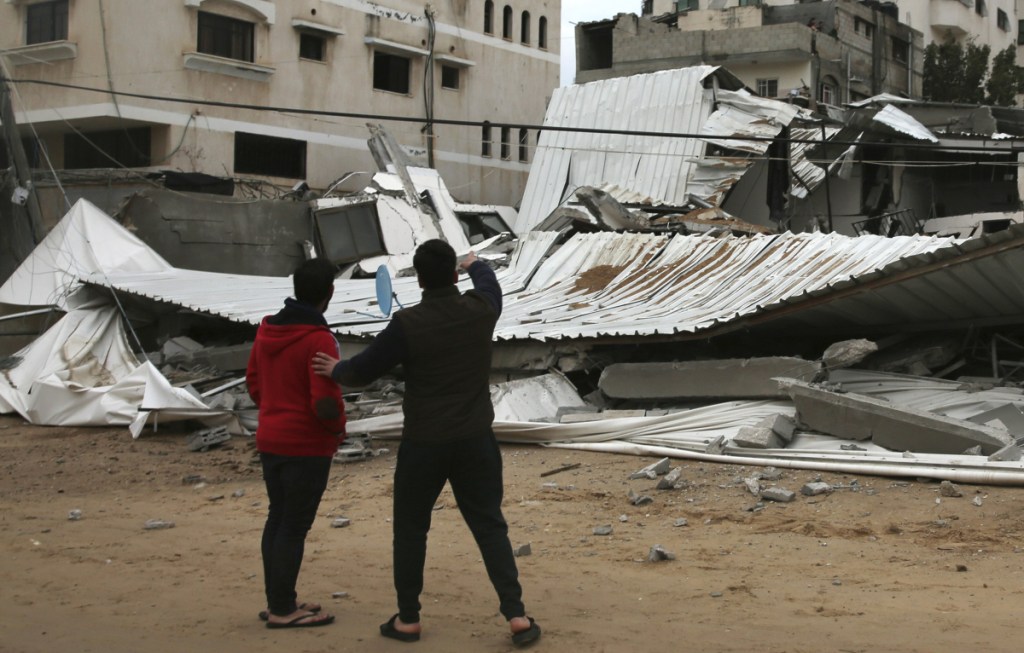Israeli aircraft struck dozens of sites in the Gaza Strip and Palestinian militants fired rockets at southern Israel early Friday after an attack on the Tel Aviv area dramatically escalated tensions weeks before Israel’s April 9 election.
The rocket launches at Israel’s center were the first since the 2014 Gaza Strip war. They didn’t land in built-up areas and no casualties were reported on either side. Egyptian mediators were trying to broker an end to the confrontation, Gaza officials said, and in a sign that the ruling Hamas movement wasn’t interested in further escalation, the weekly Friday protest against Israel that’s been going on for nearly a year was called off.
The timing of this latest outbreak in violence could create a political dilemma for Prime Minister Benjamin Netanyahu, who convened an emergency session at the Defense Ministry late Thursday after the initial assault. If he is seen as hesitating to strike back forcefully, that could cost his Likud party votes among right-wingers who seek a tough response to attacks from Gaza. A large-scale offensive, however, would entail other risks if Israeli casualties mount.
“He’s caught between the need to preserve calm on Israel’s border with Gaza and exposing himself to attacks by his political rivals,” Hugh Lovatt, a policy fellow with the Middle East and North Africa program at the European Council on Foreign Relations, said before the latest confrontation.
Israel’s military blamed Hamas for the initial rocket fire, despite its denial. No group has claimed responsibility.
Military spokesman Brig. Gen. Ronen Manelis said about 100 Hamas targets in Gaza were attacked in response. They included a naval post that also serves as a weapons building complex, an underground rocket manufacturing site and a drone facility, the military said. Aerial defenses intercepted three of four rockets fired from Gaza, it said.
In the course of nearly a year of Hamas-led protests that have led to the deaths of more than 260 Palestinians and two Israeli soldiers, several serious confrontations threatened to verge on war, but the sides have stepped back from the brink.
Israel and Gaza have been at war three times since late 2008. With Gaza having taken the brunt of the violence, and its economy in a shambles, there is little appetite in the seaside territory for another round.
Hamas recently has been contending with a rare outbreak of protests against deepening hardship.
On Thursday, witnesses said Hamas security forcibly dispersed two demonstrations against the dire economic situation. Police in the Jabalia refugee camp opened fire in the air, arrested several demonstrators and confiscated the cameras of local journalists, the witnesses said. In the camp, and in the town of Deir el-Ballah, demonstrators chanted slogans demanding a life with dignity. Social media activists published accounts and footage of Hamas police officers appearing to beat up demonstrators.
Hamas said the protests were organized without police permission and that demonstrators threw stones at police. Several days ago, human rights groups in Gaza accused Hamas of arresting 12 Gaza activists who called for rallies against rising taxes on dozens of commodities.
The tax burden has exacerbated a situation already made desperate by a confluence of factors. Gaza has been under Israeli and Egyptian blockade since Hamas, considered a terrorist group by much of the West, wrested power from the West Bank-based Palestinian Authority in 2007. It hasn’t recovered from its devastating wars with Israel, and Palestinian Authority President Mahmoud Abbas has made things even tougher with economic sanctions on Gaza intended to batter Hamas.
Send questions/comments to the editors.



Success. Please wait for the page to reload. If the page does not reload within 5 seconds, please refresh the page.
Enter your email and password to access comments.
Hi, to comment on stories you must . This profile is in addition to your subscription and website login.
Already have a commenting profile? .
Invalid username/password.
Please check your email to confirm and complete your registration.
Only subscribers are eligible to post comments. Please subscribe or login first for digital access. Here’s why.
Use the form below to reset your password. When you've submitted your account email, we will send an email with a reset code.